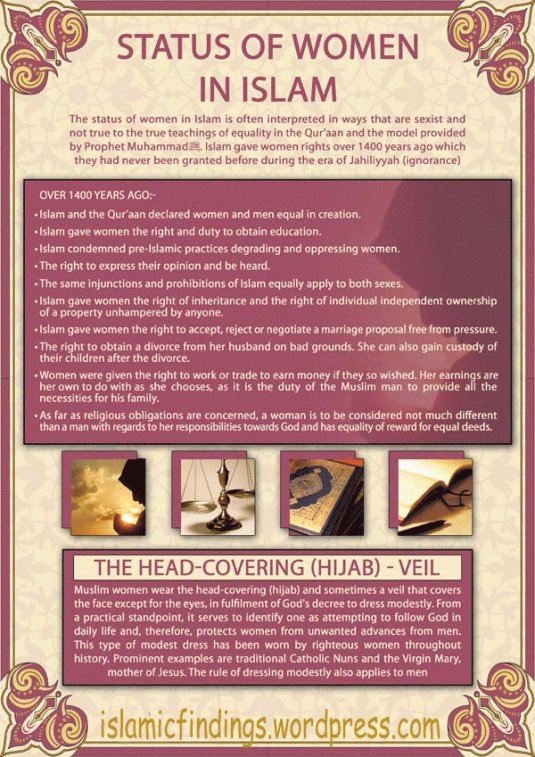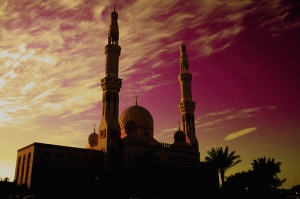The Tradition (Hadith) related below is said to be responsible for the revelation of the following Noble Qur’anic verses:
“… and prefer (them) before themselves, though poverty may afflict them.” (Noble Qur’an, 59:9)
It is related that: One day a poor, hungry man came to Prophet Muhammad (saw) to ask for some food. Prophet Muhammad (saw) guided him to go to the homes of his wives and get something to eat. All of them had no food in their homes and thus could not offer the poor man anything. He returned to Prophet Muhammad (saw) who then asked his companions (Sahabah), “Who is going to invite this guest to his home?” Imam Ali (as) immediately offered to take the man as his guest and soon they proceeded towards Imam Ali’s (as) home.
On reaching home, Imam Ali (as) informed his wife Fatimah bint Muhammad (sa) that they had a guest and also enquired as to what they had at home for food. Fatimah bint Muhammad (sa) said that they had just enough food to feed the children, but that they would give priority to the poor guest. Imam Ali (as) then offered to turn off the lamp in the house, asking Fatimah bint Muhammad (sa) to put the children to bed. Imam Ali (as) thought of making the home dark so that their guest would not notice that his hosts had very little food and get embarrassed. Imam Ali (as) accompanied the guest on the dinner mat but the guest did not notice that Imam Ali (as) had not eaten, since the house was dark.
The night passed by in this manner. The guest ate comfortably and the members of Fatima Al-Zahra’s (sa) home slept hungry.
It has been confirmed by numerous exegetes of the Noble Qur’an that those Qur’anic verse mentioned above refers to the incident that demonstrated the kindness and self-sacrifice of Fatimah bint Muhammad (sa) and her family.
Jabir ibn Abdullah Al-Ansari (ra), a prominent companion (Sahabi) of Prophet Muhammad (saw) has reported that:
One day, we were with Prophet Muhammad (saw) after Asr (after noon) prayer when an old immigrant man came by who was wearing worn out clothes and was barely able to walk because of his old age and weakness. Prophet Muhammad (saw) inquired him about his welfare and the old immigrant man said, “O Prophet of Allah! I am starving, so feed me; I am naked, so cloth me; and I am poor, so help me!”
Prophet Muhammad (saw) said, “Surely I have nothing to give you, yet, he, who guides to goodness is equal to one who performs it. So go to the house of one (she) who loves Allah and His messenger, and Allah and His messenger love her. The one who prefers Allah over herself; I mean Fatima (sa).”
Fatima Al-Zahra’s (sa) house was near to that of Prophet Muhammad (saw). He (saw) asked Hazrat Bilal (ra) to lead the old immigrant man to her house. As soon as they reached her house, the old immigrant man cried out loudly, “Peace be upon you O people of the house of Ahlul Bayt of Naboowah, where the angles frequent their visits; where Roohul Amin (Jibril) descends bringing what the Lord of the worlds reveals.” Fatimah bint Muhammad (sa) responded to his greetings and asked who he was, to which, the old immigrant man replied, “I am an old Arab man. I have emigrated from a distant land. O Daughter of Prophet Muhammad! I am hungry and in need of clothing – so console me and may Allah bless you.”
This incident occurred at a time when Prophet Muhammad (saw), Imam Ali (as) and Fatimah bint Muhammad (sa) had not eaten anything for three days. Fatimah bint Muhammad (sa) looked around. The only thing she could see in the house was a goatskin on which his two little children, Imam Hasan and Imam Hussain used to sleep. She picked up the goatskin and came to door. She extended that goatskin to the old man from behind the door and said: “Please take this and fulfill your needs.” However, the old man said, “O Daughter of Prophet Muhammad! I complain to you of hunger and you give me a goatskin? How can I eat this?”
Fatimah bint Muhammad (sa) thought and then she realized that she was wearing a necklace which was the wedding gift from Fatimah the daughter of Hamzah bin Abdul-Muttalib. Fatimah bint Muhammad (sa) took the necklace off and gave it to the old man saying, “Sell this and Allah (SWT) will grant you with a solution to your problem”. The old man took the necklace, brought and showed it to Prophet Muhammad (saw). Prophet Muhammad (saw) looked at the necklace and his eyes filled up with tears. Prophet Muhammad (saw) said, “Indeed Allah (SWT) will grant you a solution, for Fatima, the Mistress of all the women has given to you this necklace.”
Hazrat Ammar bin Yasir (ra), who was present among the companions (Sahabah) said, “O Messenger of Allah! Do you allow me to buy this necklace?” Prophet Muhammad (saw) said, “Buy it Ammar, surely if all men and women participate in its purchase, Allah (SWT) will protect them from Hellfire”. Hazrat Ammar bin Yasir (ra) asked the old man for its price and he replied, “A meal of bread and meat, a Yemeni shirt to cover myself and a dinar to return to my family.” Hazrat Ammar bin Yasir (ra) gave him 20 dinar and 200 dirham, a Yemeni shirt, wheat bread and meat, and a horse to take him to his home. Prophet Muhammad (saw) asked the old man if he was satisfied with all that and he replied in affirmation. “So reward Fatima for her kindness”, said Prophet Muhammad (saw). The old man prayed, “O Allah! Give Fatima that which no eyes have ever seen and no ears have ever heard.”
Hazrat Ammar bin Yasir (ra) perfumed the necklace with musk and sent it to Prophet Muhammad (saw) with a slave named Sahm whom he had purchased with the booty he received from Khyber, saying, “Give this necklace to the Messenger of Allah and tell him that I gift you to him too.” When the slave delivered the necklace and the message, Prophet Muhammad (saw) said to him, “Take this necklace to Fatima and I gift you to her”. When the slave came to Fatimah bint Muhammad (sa), she took her necklace back and set the slave free. When the slave was set free, he laughed loudly.
People who had been watching the whole thing, asked Sahm for the reason of his laughing. Sahm replied: “I laughed when I thought of the abundance of goodness in this glorious necklace – it came out of the house, fed a hungry man, clothed a naked man, and provided for a lost wayfarer. It then freed a slave from his bond and then returned to its rightful owner/mistress.”
The above incident once again demonstrate the kindness and self-sacrifice of Fatimah bint Muhammad (sa) and Prophet of Islam, Mohammed (saw) taught us, the Muslims at large, to be grateful to anyone who provides any kind of help. The best expression of that gratitude is doing a Dua for your benefactor. Fatimah bint Muhammad (sa) did not need any Dua/Prayer from a stranger, but that was the teaching of the Prophet of Islam, Mohammed (saw) and his methodolo














